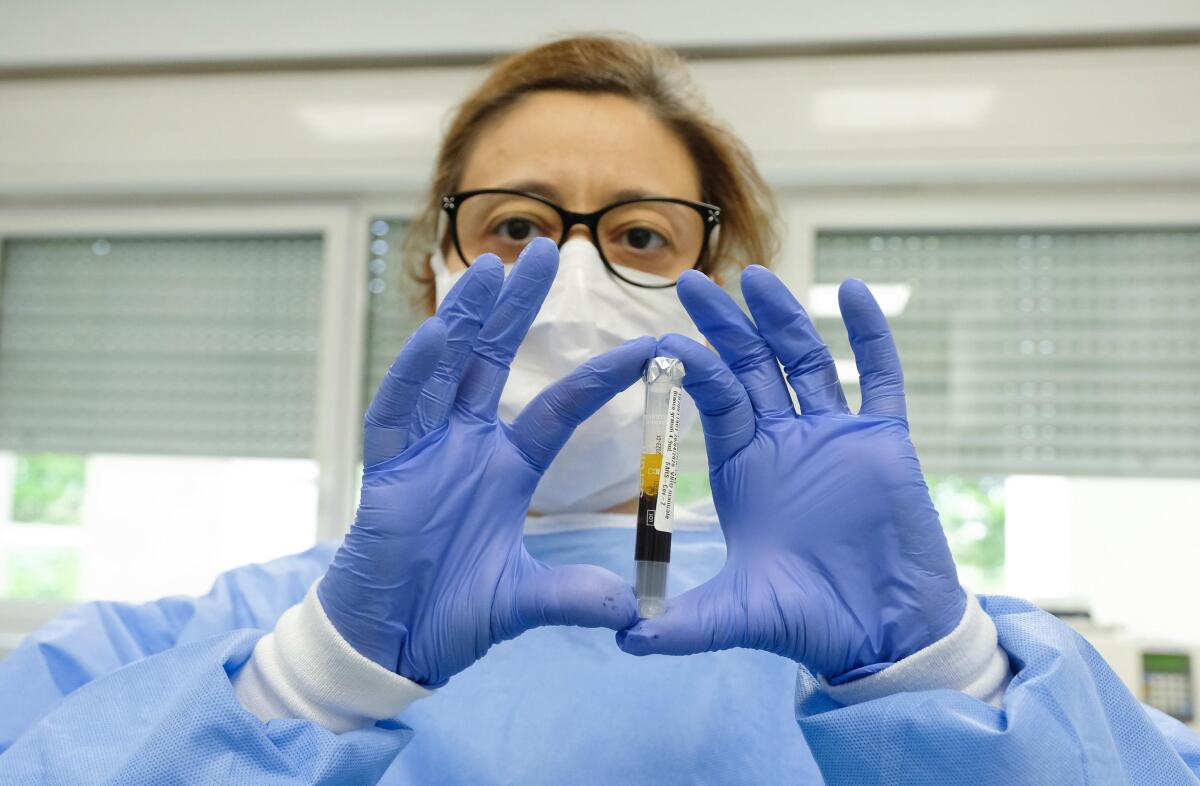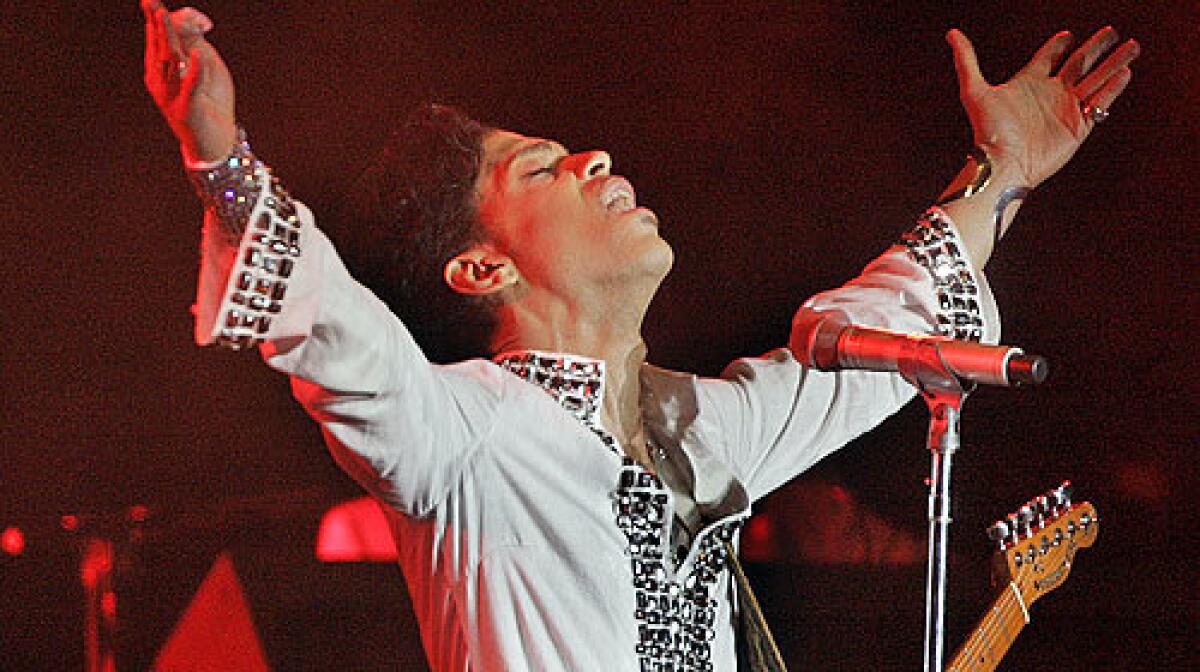Newsletter: The ‘Wild West’ for antibody tests

- Share via
The rush is on for immunity tests, but how available and useful will they be?
TOP STORIES
The ‘Wild West’ for Antibody Tests
As debate intensifies about how and when the United States can resume some semblance of life as we knew it before the coronavirus — and several Southern states moved to lift stay-at-home orders, despite health officials’ warnings — there’s more chaos surrounding a tool that’s seen as essential to getting back to normal: immunity testing.
“It’s already a case of the continuing Wild, Wild West,” said David Relman, a professor of microbiology and immunology at Stanford who is on a White House advisory panel on testing. “The sequel is certainly live and in action.”
Dozens of companies have rolled out tests that promise to tell users whether they have been exposed to the virus and therefore may have some kind of immunity — with the emphasis on “may.” These serology tests, which look for antibodies in blood that have the ability to fight off the virus, range from simple sticks to complex lab procedures.
But just as there have been problems with ramping up coronavirus tests, there may be a shortage of antibody tests. In some cases, the screenings require the same mixing liquids that are in short supply for those earlier tests, potentially sparking another round of fierce competition among states, cities and counties — and even the federal government — all vying for the same limited resources as more places begin immunity testing.
The reliability of the tests is also unknown, creating a marketplace where buyers should beware. And though most scientists hope the presence of antibodies does bring some immunity, no one yet knows how long it could last or whether it’s possible to get the virus more than once.
Still, public health officials are starting broader pilots of serology testing. In Los Angeles County, researchers released initial results finding that 4.1% of adults have antibodies to the virus in their blood, an indication of past exposure. That means hundreds of thousands of county residents may have been infected with the coronavirus by early April. But this and other studies show that we’re far away from achieving the “herd immunity” that, absent a vaccine, would be a key to returning to normal life.
Start your day right
Sign up for Essential California for the L.A. Times biggest news, features and recommendations in your inbox six days a week.
You may occasionally receive promotional content from the Los Angeles Times.
A Tragic Father-Daughter Story
“Chanell Jackson rubbed sanitizing gel on her hands and pulled a protective gown over her clothes as she had done so many times before. As a nurse, she did this ritual to help deliver wailing babies and wheel worried women into surgery. But this was different. This was her father.”
So begins reporter Angel Jennings’ story on Charles “Chuck” Jackson, who had guarded schools in L.A.’s toughest neighborhoods during the city’s most violent era, and his daughter Chanell, who chronicled his illness and death on social media to dispel the myth that black people were somehow immune to the coronavirus.
A Drop in the Barrel
The stunning collapse of oil prices Monday was the latest shock to an economy roiled by the coronavirus outbreak — and yet another jolt to an energy sector already grappling with a challenging transition from fossil fuels to cleaner power sources.
The price of West Texas crude fell to negative $37.63 per barrel as sellers scrambled to offload their May futures contracts before a Tuesday expiration date — even if they had to pay buyers to make the deal. The reason: With the pandemic bringing the economy to a standstill, there is so much unused oil sloshing around that American energy companies have run out of room to store it.
Contracts beyond May are still selling at relatively normal prices. But oil’s plunge into negative territory is just one piece of a larger story playing out across the energy sector, with long-term implications for the world’s ability to phase out the fossil fuels that are responsible for rising global temperatures.
‘The Biggest Slap in the Face’
Have you gotten your stimulus check? If you meet the income requirements and are a U.S. citizen, but you’re married to an immigrant who doesn’t have a Social Security number, the answer is probably no — and never.
More than 1 million U.S. citizens have been blocked from receiving stimulus checks simply because they filed a joint tax return with a spouse who does not have a Social Security number. The only exception is if one spouse is a member of the U.S. Armed Forces.
“It’s the biggest slap in the face that the government left us out,” said one woman in the Midwest.
More Top Coronavirus Headlines
— Trump tweeted that he will sign an executive order “to temporarily suspend immigration into the United States” because of the coronavirus. He offered no immediate details as to what immigration programs might be affected by the order.
— Congressional leaders and the White House were close to a deal over an emergency coronavirus package to replenish the Paycheck Protection Program, a small-business assistance program that ran out of funds last week. Critics say misuse of the popular loan program by large companies has squeezed out smaller businesses.
— Gov. Gavin Newsom acknowledged that pressure from Californians and local governments is building to modify the statewide stay-at-home order, but he said restrictions will remain in place until the threat to public health subsides and adequate testing and other safeguards are implemented.
— Newsom’s decision to spend almost $1 billion in taxpayer funds to buy protective masks drew national attention. It’s also drawing skepticism, as few details have come out in the two weeks since.
— Making wills, sleeping in cars to self-quarantine, looking to buy life insurance: The pandemic has medical workers on the front lines confronting their own mortality.
— A machine that could decontaminate tens of thousands of N95 masks each day has arrived in California. Medical experts hope it will help alleviate equipment shortages.
Plus, here are some tips on getting through the days ahead. For more, sign up for Coronavirus Today, a special edition of The Times’ Health and Science newsletter. As with all our newsletters, it’s free:
— These restaurants are offering takeout and delivery during the coronavirus pandemic.
— How to care for someone with COVID-19.
FROM THE ARCHIVES
On this day in 2016, Prince was found dead in his home near Minneapolis. It was a shocking end for one of pop’s greatest figures. He was one of the best-selling artists of all time, with a Rock and Roll Hall of Fame induction, seven Grammy Awards and an Academy Award for original song score for the 1984 film “Purple Rain.” “He was a misfit when there weren’t black misfits on a stage that big,” wrote The Times’ Marc Bernardin.
An investigation concluded Prince died from an overdose of fentanyl that had been mislabeled. He was 57.

CALIFORNIA
— The Los Angeles Unified School District is confronting an estimated $200 million in emergency coronavirus costs, but it’s not clear where additional funding might come from.
— Two families that lost members in the helicopter crash that killed Kobe Bryant are suing the helicopter company.
— London Breed is San Francisco’s mayor. She’s also become one of the recognizable faces of coronavirus response for her early leadership that’s reassuring (and sometimes scolding).
— With or without visitors, the San Diego Zoo’s animals still need care. You can’t furlough a flamingo.
Support our journalism
Subscribe to the Los Angeles Times.
NATION-WORLD
— Joe Biden’s search for a running mate is moving into high gear as he and his campaign face conflicting demands.
— Authorities in Mexico say a Mexican citizen deported from the United States is the suspected source of a coronavirus outbreak at a shelter in the city of Nuevo Laredo.
— Israeli Prime Minister Benjamin Netanyahu and his chief rival said they have forged a deal to form an “emergency” government, ending months of political paralysis.
— Speculation about the health of North Korean leader Kim Jong Un ran wild when reports surfaced that he was in fragile condition after recent heart surgery. South Korea’s presidential office says no suspicious activities have been detected.
— Germany‘s Werneck Brewery has survived world wars, economic crises and decades of declining beer consumption. The coronavirus closed it.
HOLLYWOOD AND THE ARTS
— Did you see the Season 5 finale of “Better Call Saul”? If not, don’t read this spoiler-filled interview with a villain on a key moment.
— Fandango will buy Vudu, Walmart’s movies-on-demand service. The sale comes as movie ticket sales dry up and streaming surges.
— Painful closures lie ahead for L.A. art galleries. We heard from 35 of them and how they’re trying to survive.
— Prince Harry and his wife, Meghan, will no longer cooperate with several British tabloid newspapers, saying they won’t “offer themselves up as currency for an economy of click bait and distortion.”
BUSINESS
— Fifteen deaths have been linked to coronavirus in the airline industry in nine days. Why are planes still flying?
— L.A.’s craft beer scene used to fear a bubble with too many breweries popping up too quickly. Now a greater threat has arrived as the pandemic threatens to shut many of them down.
SPORTS
— Two fans are suing Major League Baseball, its teams and its official ticket resale partner in federal court seeking a refund of ticket costs and ancillary fees for games that have not been played. The suit is looking to get class-action certification, which would enable all fans to join.
— The shutdown of sports because of the coronavirus pandemic is propelling a historic decline in U.S. TV advertising: Sales could be down by as much as $12 billion in the first half of the year.
Free online games
Get our free daily crossword puzzle, sudoku, word search and arcade games in our new game center at latimes.com/games.
OPINION
— In this pandemic, it’s “Live free — and die.” Protesters are right that the pandemic restrictions are doing tremendous damage to the economy, The Times’ editorial board writes, but that’s not a reason to lift the stay-at-home orders.
— It’s natural to long for an end to the coronavirus quarantine. But we should remember what it has shown us: The human-made disasters we’ve grown accustomed to overlooking, writes columnist Frank Shyong.
WHAT OUR EDITORS ARE READING
— Some of the largest Facebook groups calling for anti-quarantine protests have something in common: They’re run by the same trio of brothers. (Washington Post)
— A giant Procter & Gamble plant where Charmin toilet paper is produced has kept on humming and might offer some lessons for other businesses about what it will take to reopen, while also keeping workers safe. (NPR)
ONLY IN L.A.
Olivia Arthur is a sound mixer by profession. But on her street in Highland Park she’s known as the eccentric art lady — a reputation she doesn’t quite mind. A self-described recluse, Arthur grew concerned when she saw the look of worry in people’s eyes as the coronavirus lockdown set. So she decided to turn some fences into a makeshift abstract art gallery.
Comments or ideas? Email us at headlines@latimes.com.
Sign up for Essential California
The most important California stories and recommendations in your inbox every morning.
You may occasionally receive promotional content from the Los Angeles Times.






